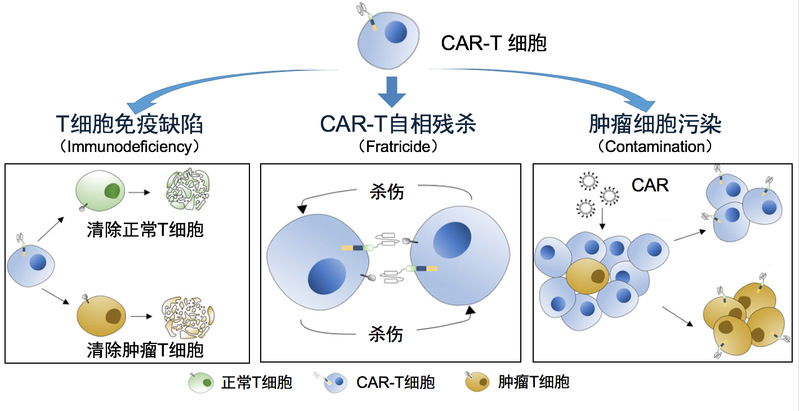1. Develop new CAR-T therapies using synthetic immunology approaches (Immunity 2020, Cover article)
CAR-T therapy is a type of cancer immunotherapy that recognizes and kills tumor cells in vivo by expressing chimeric antigen receptors (Chimeric Antigen Receptor, CAR) on a patient's own T cells. CAR-T therapy has shown remarkable efficacy in hematological cancers and is approved for the treatment of acute B lymphocytic leukemia and certain types of non-Hodgkin's lymphoma. However, as a new treatment, CAR-T therapy also has its limitations. More and more clinical data shows that up to 30%-50% of patients treated with CAR-T therapy might experience tumor recurrence, and most of these patients will experience recurrence within one year after receiving CAR-T therapy. There are several reasons for tumor recurrence, of which the in vivo persistence of CAR-T cells (the length of time that CAR-T cells survive in the patient) is a decisive factor. In clinical studies of acute lymphocytic leukemia and chronic lymphocytic leukemia, it has been found that the efficacy of CAR-T therapy is positively correlated with the in vivo persistence of CAR-T cells. Therefore, exploring the regulation mechanism of the in vivo persistence of CAR-T cells has become a current research hotspot.
Our team and collaborators published a research paper titled Chimeric Antigen Receptor Designed to Prevent Ubiquitination and Downregulation Showed Durable Anti-tumor Efficacy on Immunity (Cover article). By studying the regulation mechanism of CAR-receptor trafficking in CAR-T cells, a new type of recyclable CAR was designed, which significantly improved the in vivo persistence and anti-tumor effect of CAR-T cells, providing a new strategy for preventing tumor recurrence after CAR T therapy. The technology transfer was successfully completed at the end of 2020 and clinical trials related to recyclable CAR-T are expected to be launched in 2021.
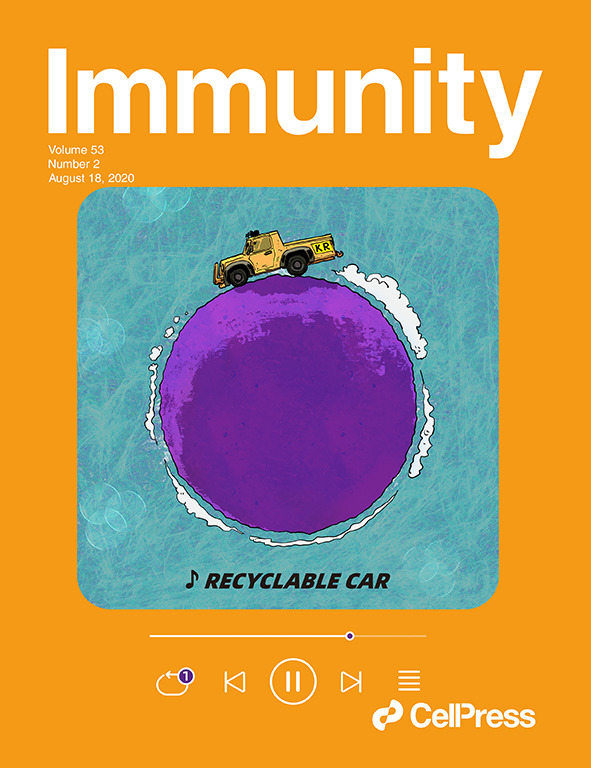 Wentao Li, Shizhen Qiu, Jian Chen, Shutan Jiang, Wendong Chen, Jingwei Jiang, Fei Wang, Wen Si, Yilai Shu, Ping Wei, Gaofeng Fan, Ruijun Tian, Haitao Wu, Chenqi Xu, Haopeng Wang. Chimeric Antigen Receptor Designed to Prevent Ubiquitination and Downregulation Showed Durable Antitumor Efficacy. Immunity. 2020.
Wentao Li, Shizhen Qiu, Jian Chen, Shutan Jiang, Wendong Chen, Jingwei Jiang, Fei Wang, Wen Si, Yilai Shu, Ping Wei, Gaofeng Fan, Ruijun Tian, Haitao Wu, Chenqi Xu, Haopeng Wang. Chimeric Antigen Receptor Designed to Prevent Ubiquitination and Downregulation Showed Durable Antitumor Efficacy. Immunity. 2020.
Immunity invited Prof. Stephen Gottschalk and Prof. Hongbo Chi to write a preview for our article.
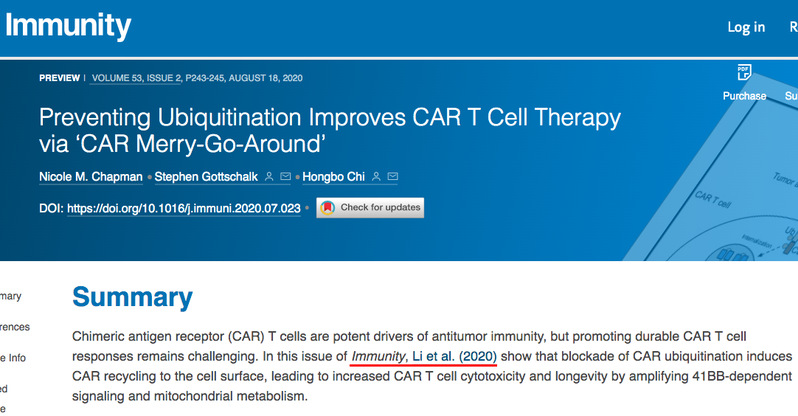
2. Apply a genome-wide CRISPR genetic screen to map T cell functional regulatory networks (PNAS,2018)
As an essential part of the human immune system, T cells play a vital role in immune monitoring and killing tumor cells. However, tumor cells can inhibit the anti-tumor activity of T cells via multiple mechanisms, thereby escaping from the body's immune system attack. Therefore, tumors can be treated by increasing the activity of T cells in the clinic. At present, T cell-based tumor immunotherapy has achieved remarkable success in clinical practice and has broad application prospects. However, the existing treatments are only effective for a fraction of cancer patients, and there are considerable side effects. Therefore, further investigation on the regulation mechanism of T cell activation will contribute to developing new tumor immunotherapies to improve the efficacy and benefit more patients.
In cooperation with Arthur Weiss lab at UCSF and Lai Wei's group at Sun Yat-sen University, our research team published a research paper titled A genome-wide CRISPR screen identifies FAM49B as a key regulator of actin dynamics and T cell activation in PNAS. In the previous studies from our laboratory, a gene-editing toolbox for studying T cells has been established. This project used a genome-wide CRISPR genetic screen to systematically study the molecular mechanism of T cell activation and illustrate a regulatory map of human T cell functions. It is worth mentioning that this study is the FIRST reported genome-wide CRISPR screen on T cells.
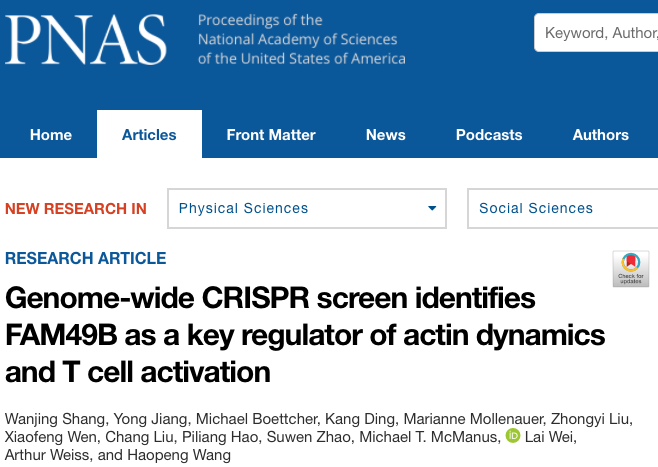
Dr. Lawerence Samelson, associate director of the Center for Cancer Research at the National Cancer Institute, gave a high appraisal of this work: Shang et al by reporting a genome-wide CRISPRscreen in Jurkat T cells have performed an important service for the immunologycommunity. The lists of activating and inhibitory molecules that they havereported will be of great use to many investigators. This is an excellent studyand important contribution to those studying lymphocyte activation and signaltransduction in general.
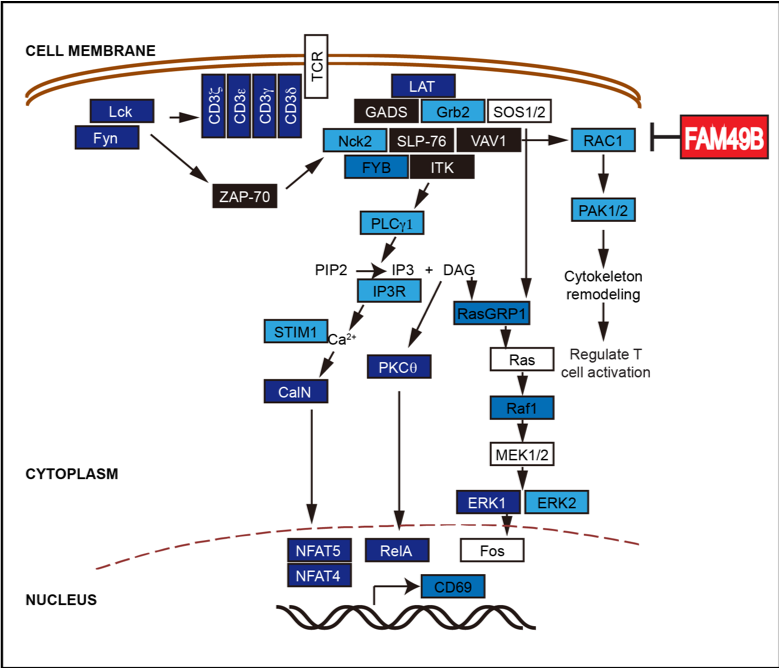
Shen Chi, Arthur Weiss, Haopeng Wang. A CRISPR-based toolbox for studying T cell signal transduction. BioMed Research. 2016.
Wanjing Shang, Yong Jiang, Michael Boettcher, Kang Ding, Marianne Mollenauer, Zhongyi Liu, Xiaofeng Wen, Chang Liu, Piliang Hao, Suwen Zhao, Michael T McManus, Lai Wei, Arthur Weiss, Haopeng Wang.Genome-wide CRISPR screen identifies FAM49B as a key regulator of actin dynamics and T cell activation.PNAS. 2018
3. Establish CAR-T therapies for T-cell lymphoma (National Key R&D Program)
CAR-T therapy has achieved remarkable results in the treatment of B cell-derived leukemia and lymphoma. But for T cell tumors that are also hemolymphatic tumors, CAR-T therapy has not been a suitable treatment plan. This is mainly due to the following fact: in vitro generated CAR-T cells, the patient's T cell tumor, and the T cells in the patient, all three of which are T lymphocytes by definition, and it is logically difficult to find a surface target to effectively distinguish these three types of cells (see the graph below). Our team cooperates with the first-line clinical team to develop a CAR-T therapy that can effectively treat T cell tumors. We expect to launch a clinical trial in early 2022.
